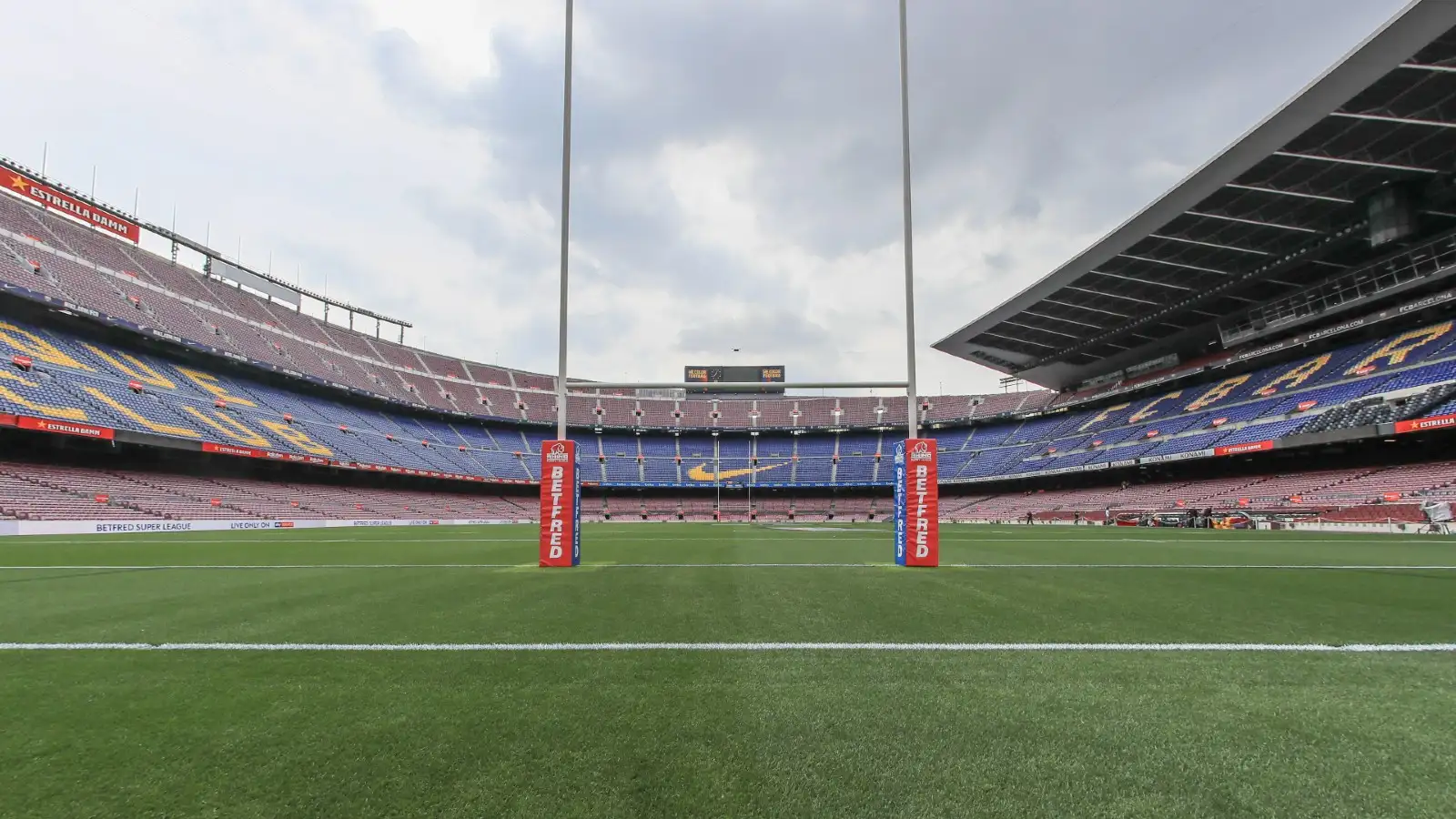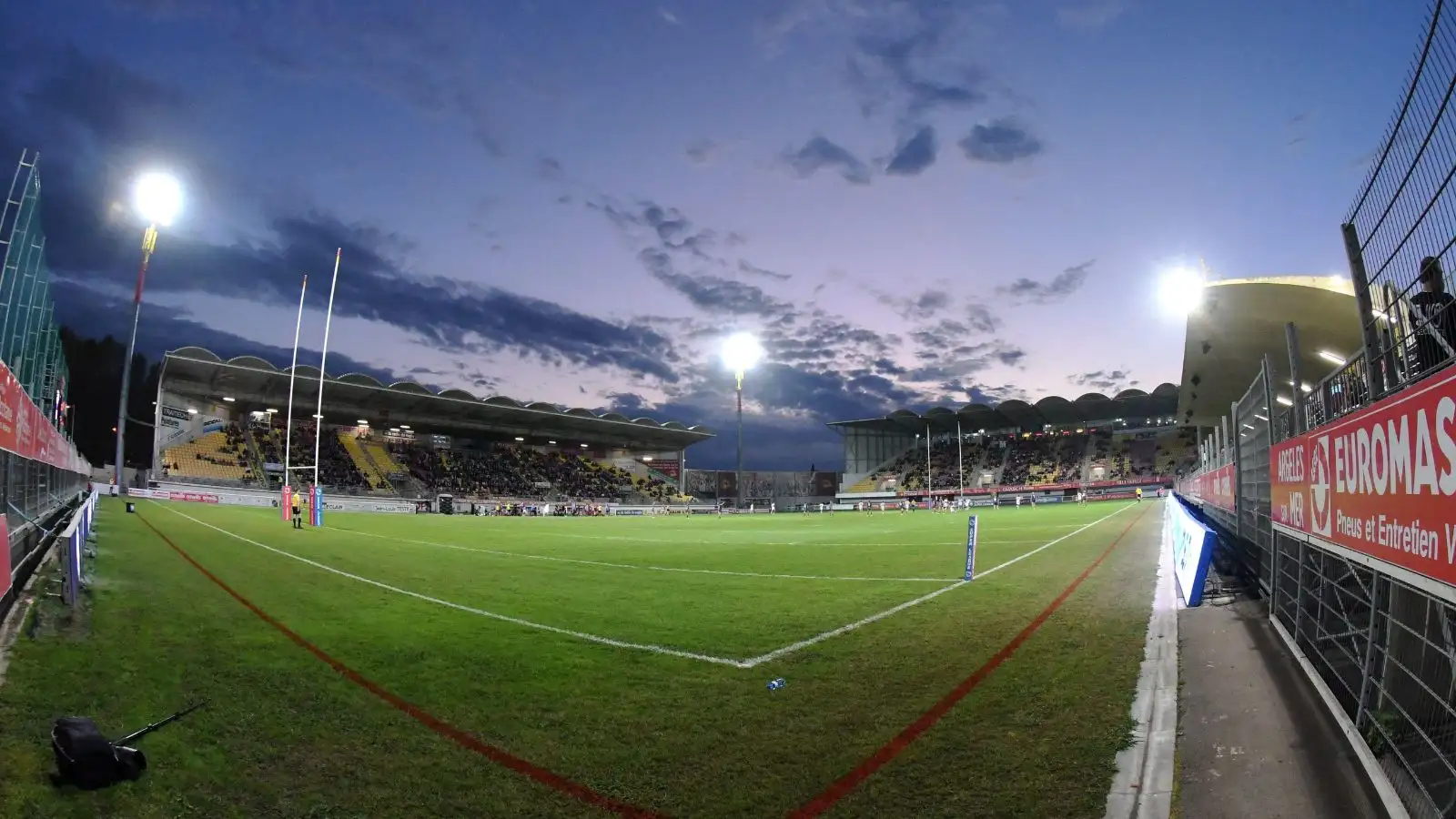Why Catalans highlight the successes and failures of expansion

The sniping in rugby league created by the licensing system, soon to be renewed by the grading system, has seen Catalans Dragons become victims of the latest smear.
Keighley’s outspoken co-owner Kaue Garcia took aim at the Perpignan-based club on social media, implying they are not adding a lot to the sport.
The reality is that Catalans are quite easily the biggest expansion success story of the Super League era.
But their 20-year journey also highlights some of the failures of expansion too, many of which are beyond their control.
Super League record-breakers
Unless another club takes a game on the road, Catalans are likely to hold the Super League attendance record for a single game for many years to come.
In May 2019, they took a game against Wigan to the iconic Nou Camp, home of FC Barcelona, in front of 31,555 fans – beating the previous record of 25,004 set by Wigan against St Helens in 2005.
I was fortunate enough to be in that ground that day, and it was quite surreal to be witnessing a rugby league match at an arena adorned by arguably the greatest football player ever at the time. Only a year earlier, I had visited Barcelona and went on the stadium tour, taking in the press box and wondering what it would have been like to cover a big Champions League night there. Little did I know that not 12-months later, I’d be sat working in the very same press box. To have our so-called ‘M62 sport’ played out in such an environment was brilliant and certainly had the cogs whirring for what potential it might have, especially given Barcelona themselves are a multi-sport club.

Now, of course a weekend in Barcelona is going to be more iconic and popular than a run of the mill weekend, and that’s always the challenge. It’s the same reason why players and fans loved Toronto. Of course they’re going to prefer that to going to (with all due respect) Keighley. But there has to be a reality to it all.
Unfortunately, COVID wiped out any momentum generated from that initial match and there hasn’t yet been any indication of a repeat visit.
But given that the Dragons represent such a passionate region, and support for Catalonia was strong on the day, it remains an opportunity within their grasp.
Challenge Cup history makers
In 2018, Catalans won their first trophy and made history by becoming the first non-English team to win rugby league’s most famous competition, the Challenge Cup.
 Photo courtesy of Richard Long
Photo courtesy of Richard Long
Their 20-14 victory over Warrington at Wembley helped set up the game at the Nou Camp in Barcelona.
Unfortunately, that day was the subject of one of Garcia’s jibes – the reduced attendance for the Catalans final resulted in a controversial request from the RFL for a £500,000 bond to play in future years, to help protect against the loss of ticket sales attributed to the Dragons’ involvement.
Strangely, it wasn’t an issue in 2007 when Catalans first reached a Challenge Cup final – which saw a crowd of 84,241, albeit for the first final at the new Wembley.
A genuine top six, elite Super League club
Since virtually day dot, Catalans have been a genuine franchise addition to Super League, attracting solid average attendances and being competitive on the pitch.
Undoubtedly the protection in the early years enabled them to grow in to the league, unlike Toulouse who were relegated in their first season.
By season three, Catalans had finished third. They have made the play-offs on nine occasions, as well as finishing in the Super 8s on a further three occasions.
In 2021, they made history by becoming the first non-English team to win the League Leaders’ Shield – and they made it through to the Super League Grand Final at Old Trafford, where they were beaten by St Helens.
How they joined – and why hasn’t it been repeated?
We’re about to implement another new way of getting teams in to Super League, yet the one method that has bought the most success still hasn’t been repeated.
We’ve had failed mergers, a cherry-picking of ‘expansion’ teams for the inaugural competition, licensing, Super 8s and automatic promotion and relegation.
None of those, perhaps with the exception of the latter on a sporadic basis, have provided a successful platform as the way Catalans were added to the competition.
Catalans, then known as UTC following a merger of two Perpignan clubs in 2000, applied to join Super League and went through a process with two other French clubs – Toulouse and Villeneuve.
In May 2004, UTC were announced as the winners of that process – nearly two years before they would play their first game in the competition, a famous win over Wigan.

They were made exempt from relegation for the first three seasons – finishing bottom in their first year, that saw Castleford relegated from 11th spot – and also had relaxed overseas quota rules in their first few years.
Proposals had been rejected to expand Super League from 12 clubs to accommodate Catalans for 2006 – arguably the biggest failure of that decision – which meant two teams went down at the end of 2005. Barely three years later, it was voted to expand the competition to 14 clubs.
Maybe that was where an opportunity was missed.
The most baffling part of it all is that the entry method of introducing Catalans in Super League hasn’t been repeated. Why?
Expansionist blog: Catalans Dragons are the franchise to learn from
The lack of progress for the France national team
At the time of UTC’s successful application, then RFL chief executive Richard Lewis said: “terrific news for Super League and UTC, and great news for French rugby league and the international game.”
That suggests there was a strategy somewhere to including Catalans, but sadly we have seen very little evidence of it.
The club themselves have done fine – the sport around it has not.
Only in recent years has the French Elite Championship become relevant, and even then there is nowhere near enough collaborate working between the RFL and French Federation.
England have played France on 15 occasions since Catalans’ inclusion, with the closest margin in those matches being 10 points – and that was in 2005, when the England team was effectively second tier behind Great Britain.
Whatever hopes Lewis might have had for improving the international game in that 2004 announcement, it is clear they have not come to fruition.
The upcoming World Cup in France may change that – though already concerns are emerging that France may have bitten off more than they can chew with the tournament.
Catalans have been able to use British players without impacting on their quota spots, which has inevitably led to less French players being used. That’s something that the IMG proposals are planning to correct by insisting on a home-grown quota.
A sprinkling of French players have made their way to English Super League clubs, but it’s not had anywhere near the impact that New Zealand Warriors’ inclusion in the NRL has had on the Kiwi national team.
Defining expansion
One of the biggest problems rugby league has is defining expansion.
Prior to the merger, the now Catalans Dragons were two separate teams – XIII Catalan and St Esteve. The former dated back to 1935. So rugby league has genuine tradition and heritage there. If anything, banging the expansion drum for Catalans does a disservice to the existing reach of rugby league.
It’s a completely different base compared to going to somewhere that rugby league has had very little history or teams, take Cornwall as a recent example.
Of course, Catalans are an expansion for ‘Super League’ as a competition – but that’s a different beast to ‘expanding rugby league’. By the same token, putting new teams in Super League at the expense of others is retracting – there are areas where participation numbers and attendances have dwindled as a result of the ‘strategy’ of the game over the past few decades.
What the future holds
It would be a bold call to remove Catalans from Super League. As previously written, there should be two French teams in Super League or none at all.
In an ideal world, there would be a booming French league that was full-time and the potential for cross-competition games between English and French league clubs.
The trouble appears to stem from the fact that in their 18 years in Super League, Catalans have struggled to attract a French TV deal, and subsequently added more revenue to the pot.
This has led to some English clubs resenting the fact they are taking central funding, which largely derives from the Sky Sports broadcast deal in the UK that the English clubs had (and would be confident of retaining) regardless of Catalans’ involvement.
Here’s hoping that whatever the solution, there is a strategy behind it that is far better than the one we’ve seen over the past 20 years.



